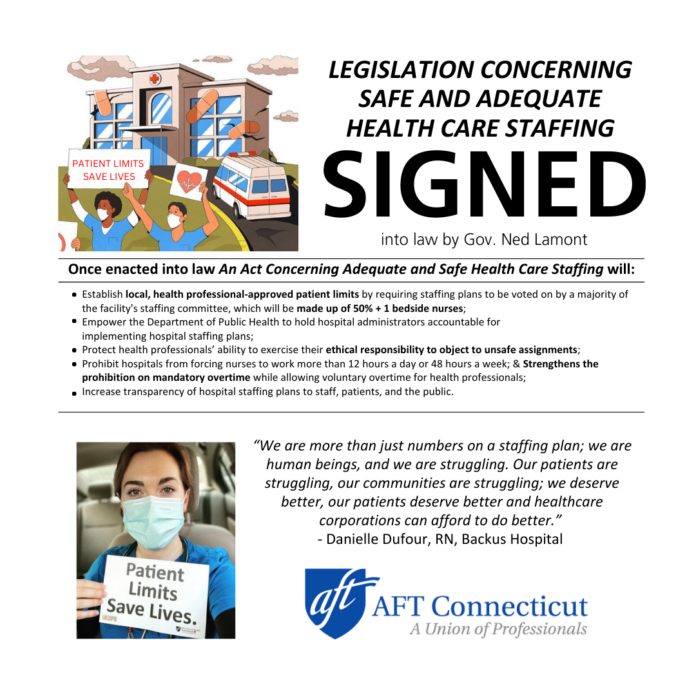The 2023 General Assembly session ended on June 7th with the passage of a biennial state budget that included legislation aimed at unsafe staffing in hospitals and health facilities. The provisions were initially included in a proposal supported by AFT Connecticut-affiliated union activists, as well as workplace safety and patient care advocates. Governor Ned Lamont signed the package into law on June 12th, empowering bedside health professionals to achieve safer care in their facilities.
“For years, healthcare workers in our union have demanded that the owners of hospital corporations put patients over profits and end short staffing,” said AFT Connecticut President Jan Hochadel. “Our healthcare workers are exhausted and frustrated trying to do multiple jobs at once, and they are leaving the profession – making the situation even worse. As these workers courageously called out, this crisis is not inevitable. It is a choice the hospital corporations are making. That is why I was proud to cast a vote to help east the ‘Code Red’ crisis in care. It is good for healthcare workers; more importantly, it is good for the patients they serve,” added Hochadel, who also represents the 16th district in the state Senate.
Click here to read our press release following Gov. Ned Lamont’s signing of the state budget.
The original bill, An Act Concerning Adequate and Safe Health Care Staffing, faced stiff opposition from both the health industry lobby and Republican state legislators. Revisions negotiated by key lawmakers on the General Assembly’s joint public health committee gained strong, bipartisan support before being included in the 2023-24 state budget implementer.
Click here to watch the top Republican senator on the legislature’s public health committee praise the updated legislation.
“These provisions in the state budget will help recuit and retain bedside caregivers,” said Sherri Dayton, RN, president of our Backus Federation of Nurses and AFT Connecticut Vice President of Healthcare. “As conditions at the bedside grew worse, more and more healthcare workers left the profession. By empowering hands-on healers to help set care standards and removing mandatory overtime language from union contracts, our patients can expect the level of care they deserve,” added Dayton, a registered nurse at the Plainfield emergency care center.
The new statutory language requires hospital staffing committees to be made up ofa majority of clinical care providors who will propose and vote on their facility’s staff-to-patient ratios. Those will then be reported to the state health department – and if not met 80% of the time, administrators will face fines. Additionally, it strengthens the prohibition on mandatory overtime (OT) while allowing voluntary OT for health professionals.
In mid May, activists from several healthcare local unions took to the State Capitol in Hartford to urge lawmakers to support the original proposal. In one-on-one conversations they shares personal stories of working at the bedside inside of Connecticut’s hospitals.
Click here for a collage from our “Safe Patient Limits” lobby day.
This action allowed weeks of members’ online outreach to their elected representatives in which they provided critial insight into their daily struggle to meeting patients’ needs. The letter-writing efford was preceded by a hearing in late March on the initial bill where an unprecedented number of caregivers testified to the public health committee. In their brief statements, nurses and health professionals made emotional and compelling arguments, setting the state for an overwhelming majority of lawmakers to eventually embrace safe patient limits.
Click here for our video ad with highlights of members’ powerful testimony.
Union activists kicked-off this latest grassroots legislative action with a new briefing at the State Capitol in late January, where they were joined by AFT’s national president and legislative leaders. They collectively committeed then to what has become a successful effort to dramatically improve their work lives for the better.



